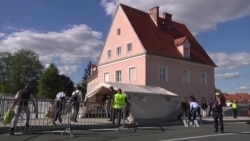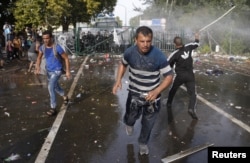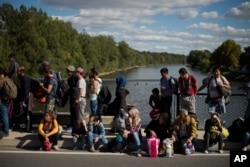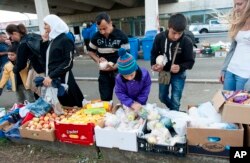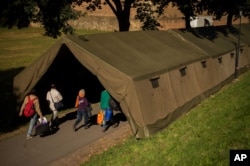Ali knew the route from his native Syria to Germany wouldn't be easy. What he didn't expect was blatant hatred and callous violence.
“The Hungarians broke my hand and my friend's hand, too,” said Ali, who asked not to be identified by his full name for fear of his family in Syria.
In the past weeks, he has crossed seas, apparently endless plains, misty forests and mountain ranges. Then, in Serbia, his ultimate goal, the European Union, seemed within reach.
Abuse in Hungary
But when he tried to cross into Hungary, police there beat him with batons, breaking his right hand. Another of his cohorts told the same story, and said there were others.
The message was clear: Hungary would not let him in. Desperate and badly injured, Ali turned west, aiming to cross through Croatia and Slovenia instead.
“Croatia and Slovenia were good. In Slovenia, they helped us in a hospital,” he said, pointing to the fresh, white cast wrapping his hand and lower arm.
In the past weeks, however, Hungarian authorities have enforced strict border controls, vowing not to become a haven for migrants.
Until now, Macedonia, Serbia, Hungary, Austria and, finally, Germany – the desired destination for most – has been the preferred route for refugees and migrants.
Tear gas and violence have been deployed, and a fence is being built to fend off those seeking refuge in the European Union. So far, neighboring Austria has welcomed migrants through its eastern border with Hungary. Now, authorities here are seeing increasing numbers cross its southern border with Slovenia, where the asylum seekers are still allowed to pass without major hurdles.
Bad Radkersburg crossing
The quaint, picturesque Austrian town of Bad Radkersburg, known for its hot spring spas popular with retirees, has made local front pages as it emerges as a new hotspot for illegal border crossings.
On Monday, Ali and another 377 people crossed here.
Simon Strassgurtl, the chief of operations for the Red Cross in Bad Radkersburg, said the figure is known precisely as Slovenian authorities registered the refugees and kept them for a day, then coordinated with the Austrian side, releasing them in small groups to make sure the process was peaceful and orderly.
“They are doing a very good job [in Slovenia], and we are trying to do the same to help these people,” Strassgurtl said.
Police and military presence were high, but spokespeople made it clear they were simply present to help and assist the migrants. Once the refugees were handed apple juice and couscous, authorities provided modern, double-decker buses to take them to proper overnight accommodations in the provincial capital of Graz.
Under Austria's so-called law of aliens, as well as under the EU's Dublin Regulation, authorities are tasked with stopping the migrants. These laws and regulations are still in place, Fritz Grundnig, spokesperson for the provincial police headquarters, said. Yet when a large number of people are trying to cross illegally, “humanitarian reasons” have to be considered in letting them pass.
“In principle the laws are not invalid. As long as the situation is manageable, we work according to the legal basis. But when it's not manageable, we let them pass. Certainly, the police will not enforce any laws by force of arms,” Grundnig said.
Spielfeld
In nearby Spielfeld, the major border crossing along the highway, lined by truck stops and gas stations, dozens of tents were set up in anticipation of a large refugee influx.
On Monday morning, police, army, Red Cross workers and waste management crews were ready to provide relief for hundreds.
Benjamin Gurtl is the chief of operations at Spielfeld's Red Cross camp, set up to offer food and health care and some time to rest.
When about 10 young families with children crossed, heaps of donated blankets were quickly taken from a storage facility.
“We can't say what's going to happen, but we have a lot of capacity here,” Gurtl said.
In the background, children tossed tennis balls back and forth, repurposed them as soccer balls and teased local journalists.
“We are ready,” Gurtl added, before the blankets were wrapped up again and transported back into storage.
Military to help
In total, the military has deployed 340 soldiers to the southern border, said Colonel Gerhard Schweiger, head of public relations for the military in the province of Styria. The army's presence, however, was hardly noticeable. Greeting refugees with armed forces was not the picture Austria wanted to relay to the world, he said.
“The military is not here for defense purposes, but to provide for the people in need of our help and protection,” Schweiger said. “Most of the refugees, as far as I know, have the wish to go to Germany. We support them, in close coordination with authorities in Germany. We support their wish.”




